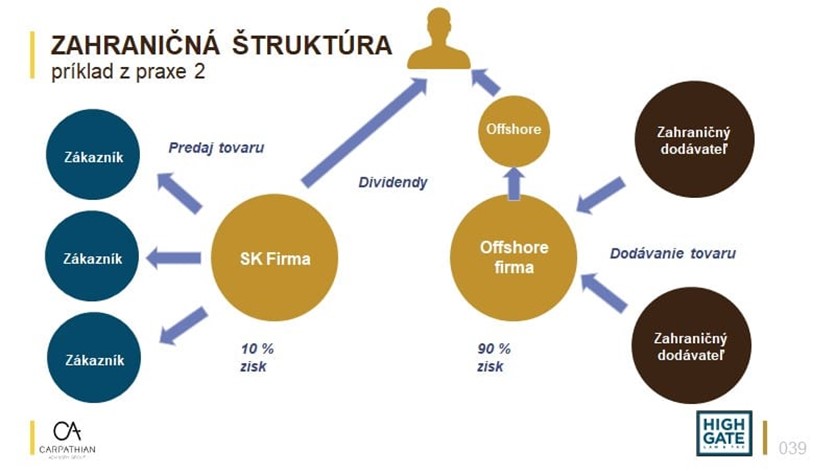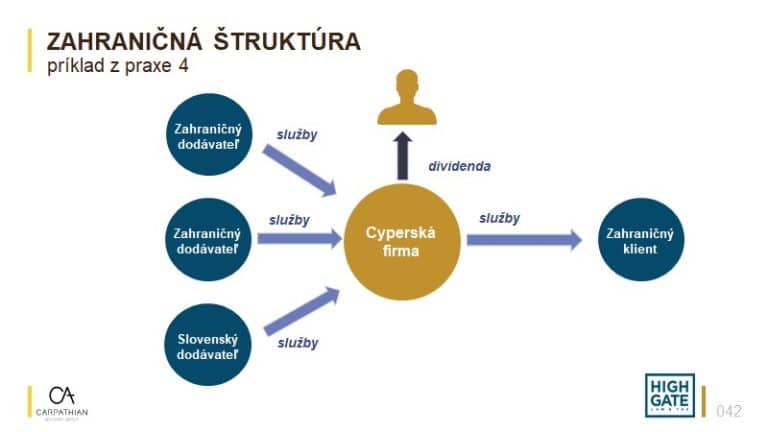
We mainly provide the following services to our clients:
An offshore company is not to be understood as a company incorporated and existing in the jurisdiction of one of the Caribbean islands. For example, a critical part of Czech holding companies, which until recently were often set up by Slovak tax advisors in order to avoid capital gains taxation in Slovakia in the event of a successful EXIT, can be considered offshore companies. Even the recent sale of a well-known Slovak IT company was made through an offshore company. This was the Austrian holding company in this case. An offshore company thus does not only include companies from the so-called. tax havens that have been set up for the purpose of reducing the tax liability of the entrepreneur.
An offshore company is any company that is not located in the country of the founder or in the country in which the functions and risks associated with the income generated by the offshore company are actually carried out. An offshore company can thus also be located in the Czech Republic as well as in the British Virgin Islands. Offshore companies are also set up to achieve a degree of anonymity. In the recent past, it was common to hide assets through offshore companies with the legitimate aim of protecting them from various vested interests or violent structures. In South America, but also in Russia or Ukraine, it is still relatively common today for many businessmen to conceal their property in order to protect their lives and the lives of their family members. The disadvantages of property transparency are also experienced by many entrepreneurs in Slovakia thanks to public access to company accounts.
There are relatively many cases where part of the assignment from our client was also to achieve greater anonymity of his property disposition. The reasons may be different. From those illegitimate motives mainly related to criminal activities, it is also the need to protect the entrepreneur and his family from the attention or unreasonable demands of his business partners or employees. Offshore companies are also set up with the intention of avoiding administrative or regulatory restrictions.
In Slovakia, for example, it happens relatively often that the commercial register does not function as the law commands. Filings are also delayed for unreasonably long periods of time, creating a legitimate demand for company formation in other countries. However, does this legitimise the use of a favourable tax regime abroad? Similarly for regulation. If Slovak or European legislation allows entrepreneurs to do business in certain areas (e.g.: securities trader or collective investment fund) only with regulatory difficulties, entrepreneurs look for more flexible offshore solutions.

Slovakia is a small country, which naturally does not have the professional infrastructure and ambition to create a full-fledged legislative framework for cryptocurrencies and related business.
The result is a legally uncertain environment, which is uncomfortable especially for larger projects. This is mainly due to the lack of predictability of the decision-making activities of the relevant Slovak authorities. That is why several Slovak projects in the field of cryptocurrencies and blockchain are considering moving their legal presence abroad. In that case, they create offshore companies.
Is it legal?
Can the state interfere with this freedom and force entrepreneurs to tax profits from abroad in Slovakia?

The establishment of an offshore company in any tax haven is not in itself illegal. However, its subsequent use may become illegal. In practice, fictitious back-to-back supplies of services from tax havens via the Netherlands or the UK to a Slovak company are still relatively common. The entrepreneur is thus able to shift profits from the 21% tax rate bracket (Slovakia) to the 0% tax rate bracket (tax haven).
On the other hand, there are situations where the use of a company based in a 0% tax country may be perfectly legal and legitimate. The fact that a country does not tax corporate profits cannot in itself be problematic.
As can be seen, for example, in the case of under-servicing Patent Box and optimization for IT and development companies or The R&D super-deduction, a 0% effective rate can be achieved relatively easily by a taxpayer even in Slovakia.
In this case, however, it is necessary to use such an offshore company for legitimate reasons (e.g.: PR, investor requirement, better legal environment, etc.).
Slovakia has gradually adopted a number of statutory amendments to discourage Slovak entrepreneurs from illegitimate use of foreign offshore companies, primarily for tax avoidance purposes. For example:
CFC rules for individuals
The purpose of the rules is to ensure that the individual behind a foreign offshore company taxes the profits of that foreign offshore company. You can see more about this topic, for example, in the video “Is it even worth having an offshore company today? Ak áno, komu a kedy?“. Peter Varga’s criticism of these rules can be found in the article My comments to the MoF (CFC rules for individuals).
CFC rules for legal entities
Probably many taxpayers are completely unaware of the existence of this institute. The purpose of these rules is to ensure that the profits of foreign offshore companies are taxed by a related Slovak company, provided that the involvement of such a foreign offshore company resulted from one or more actions that are not genuine or were carried out for the purpose of obtaining a tax advantage.
35% tax
Certain payments made by a Slovak company abroad are subject to 35% withholding tax in Slovakia. On the other hand, certain dividends, liquidation proceeds or distributions are subject to 35% tax for the Slovak recipient in Slovakia. This is why it is nowadays problematic to “just” use, for example, a company established in the United Arab Emirates.
The place of the actual wiring
Based on the analysis of the place of the actual management of the company, the tax administrator is able to attribute Slovak tax residency to the foreign company despite the fact that the company is legally established and existing under a different legal order.
Final beneficiary
When applying withholding taxes, the tax administrator may check whether the Slovak taxpayer has investigated who is the final recipient of the income paid. The aim is to prevent the use of shell holding companies or other intermediaries.
Transfer pricing
In Slovakia, the perception of transfer pricing is undersized. The OECD Transfer Pricing Directive provides for its use even in situations where the taxpayer would not normally expect it. These include, for example, various internal reorganisations and the transfer of activities from one company to another. Indeed, such activities should be taxed.
Many more
In addition to other technical provisions, laws as well as case law, it is also familiar with substantive instruments. These are different concepts of substantive fairness or abuse of discretion under which a tax administrator may, in certain circumstances, take action against a structure that in no way formally contradicts the language of the tax code.
The analysis of the possibility of using an offshore company in a specific environment for a specific client should not only include tax and accounting elements. It is also necessary to look at the structure from a legal and practical point of view.
Suppose a business wants to take advantage of the tax exemption on the gain from the sale of shares or business interests in Cyprus. If an entrepreneur does not want to invest in a relevant advisor, he can make do with the Internet and his Slovak accountant. He finds out on the internet that Cyprus does not tax these profits by default, he finds a company that will set up a Cypriot company and provide him with a registered office, and a Slovak accountant approves it.
However, if he involves a relevant tax adviser in this structure, he will find that this type of tax optimisation has a broader dimension. For example, the following questions arise:
Counsel brings to the whole context the necessary legal dimension in situations where the written law does not give a clear answer. When interpreting, it uses case law, analysis of various interpretations of law (teleological, grammatical, historical, etc.) as well as philosophy and theory of law, which are necessary to reach in unclear situations. For example, the following topics may be covered:
In addition, you also need to have relevant practical experience with tax optimisation. For example, the following aspects may also be involved:

If you are interested in this topic, please do not hesitate to contact us.
Law & Tax
Tomas Demo
tomas.demo@hg.amcef.com
Accounting
Peter Šopinec
peter.sopinec@hg.amcef.com
Crypto
Peter Varga
peter.varga@hg.amcef.com
Highgate Law & Tax
Nivy Tower, Mlynské Nivy 5,
821 09 Bratislava
Slovak Republic
Highgate Accounting
Nivy Tower, Mlynské Nivy 5,
821 09 Bratislava
Slovak Republic
E-mail
info@hg.amcef.com
Are you interested in the services of Highgate
Group? Get in touch at
info@hg.amcef.com
Careers
Interested in working for Highgate
Group? Get in touch at
info@hg.amcef.com